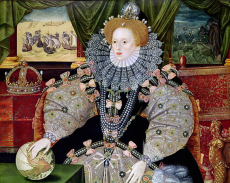
Queen Elizabeth the Ist is one of the most revered monarchs of British history, known for her stoic leadership, and perpetual status as a single Queen. Her significantly, but not extremely long reign allowed her to involve herself in a number of events which spread her fame and fortune worldwide, despite ending the renowned Tudor dynasty started by her Grandfather (although, the new King was a descendent of Henry VII). Despite her fame and popularity, throughout history, and even today, Elizabeth Ist may not have been the Queen that many believe her to be. The aspects of her, which are revered, can be found to be either damagingly negative, or even false, creating the image of a Queen who may have been very different from the one who actually sat on England's throne.
Elizabeth's most famous speech was given at Tilbury, before the expected Spanish Armada invasion. In this, there was the renowned line; 'I may have the body of a weak and feeble woman, but I have the heart and stomach of a King'. Although seemingly a very strong, and inspiring speech for girls everywhere, reading it again will prove that sentiment incorrect. The Queen, instead of making the point that as a woman, she was strong, she instead chose to align herself with her forefathers, rejecting her status as a female.
The Queen's stance as an unmarried woman throughout her life is another feature of her life, which is strangely praised. The most prominent argument for Elizabeth remaining single throughout her life is that she refused to share her power with any other, especially a man who would, by law, have more power than her. This would make sense.... Except that her sister had married several years previously, and Parliament had passed a bill, which meant that he had no power, allowing a married Queen to hold all the commanding power of our country. So, there was no strong political reason for Elizabeth to refuse marriage, undermining any idea of strength she held.
So, it appears that two of Elizabeth's praise qualities may actually have little substance, her seemingly perfect visage not necessarily being as inspiring as once thought. That said, it is important to note that Elizabeth did make some, for want of a better word ‘good’ decisions as a monarch. For example, she presented a synthesis between Protestantism and Catholicism, not only aiding in smoothing over the tensions, which had bubbled up between the sects, but also increasing her popularity as Queen. Elizabeth’s predecessors Edward, and Mary, had been staunch supporters of each side, but Elizabeth was able to take a stand in the middle, without many even realising she was doing so. Whilst actively attending Protestant sermons, she did allow some symbolism back into the Church, which was considered an aspect of the Catholic faith.
Despite her condemnation of female power, and her refusal to marry, Elizabeth still certainly made some important, and wise, decisions throughout her reign. This, however, may just act as an enforcer for the commonly recognised historical phenomenon; good rulers aren’t nice.
Image: http://upload.wikimedia.org/wikipedia/commons/7/7b/Elizabeth_I_(Armada_Portrait).jpg

0 Comment:
Be the first one to comment on this article.